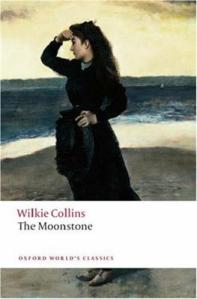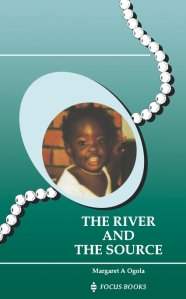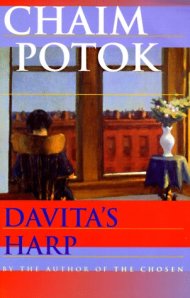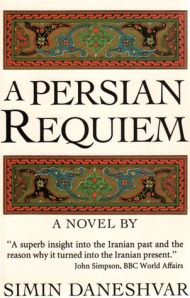Posts Tagged ‘Davita’s Harp’
Catching Up pt. 1: The Moonstone, The River and the Source, Harvard’s Secret Court, Davita’s Harp, A Persian Requiem
Well, I’m back from an amazing, stimulating, exhausting trip to Kenya, and now it’s time to whip this blog back into shape. I’m much too far behind to write full reactions to everything I’ve procrastinated writing about this summer, which is really too bad since almost all these books are quite deserving of them! May some mini-reviews suffice to merely bring me up to speed:
Wilkie Collins won my heart with The Woman in White last year and The Moonstone resolutely confirmed my love. This mystery is told from the revolving perspectives of a strong cast of diverse characters, all with distinctive voices and hidden agendas, reflecting on the night that a famous gemstone was presented to one Rachel Verinder on her birthday by her uncle only to go missing that very night. A detective is called in to unravel what can only be a messy family affair, but quickly realizes that the case of the missing moonstone diamond, taken from a Hindu shrine by Rachel’s uncle during the siege of Seringapatam, is not confined to the Verinder family or estate. In fact, the mystery of the stone’s repeated disappearances spans continents, cultures, and centuries. My copy includes an excellent introduction which makes the point that, though Collins plays on orientalist fears of the Indian Other, he also raises the question as to what constitutes theft in a colonial context. No one is completely innocent…but are they all thieves to the same degree? This, along with Collins’ exquisite storytelling, made The Moonstone one of this year’s favorites.
This book was one of my Kenya project reads, and also counts toward Kinna’s Africa Challenge. The River and the Source follows four generations of women through changes like colonialism and urbanization, faith and learning. It begins with Akoko, the most beautiful and respected young woman in her Luo community, renowned for her intelligence and character. Her daughter embarks on a new path when she converts to Christianity and enrolls her children in a religious school, from which her daughter eventually graduates before moving to Nairobi. This daughter’s own children, headed toward medical school, now lead an entirely different kind of life from their grandmother and great-grandmother, Akoko, yet Akoko’s strength of spirit appears to be genetic and nourishes each woman through adulthood and self-realization. This short novel is certainly sweeping, but flows so well that it’s not distracting or fragmentary. I really liked the way that the women in this story were so encouraging of each other in every new thing they tried, confident that even the biggest mistakes contain opportunity, that temporality is to be embraced though memory of the past is key to understanding the present. A real pleasure.
Harvard’s Secret Court: The Savage 1920 Purge of Homosexuals started off strong. Wright effectively personalizes the stories of the many young men who were cruelly, quietly, and systematically persecuted by that great so-considered bastion of enlightenment, Harvard University, for their real or perceived homosexuality. Not only were entire groups of friends expelled from the ivy league, but they remained the targets of school officials throughout their entire lives, suffering obstacles to further education and employment. Gay and/or effeminate men within school bounds as well as outside them (particularly in port communities) became scapegoats, unsurprisingly, at exactly the moment at which Harvard was forced to re-define “The Harvard Man” due to the increasing presence of Jews, Irish and Italian immigrants, and women. This history is fascinating, disturbing, and important; I applaud Wright for bringing it to light. However, he started to lose me about halfway through the book, when he started to stray from events and began to speculate on the “true” sexualities of those involved in the purge: i.e., whether or not they were truly gay, kind of gay, or just experimenting (?). I wasn’t comfortable with the authority he claimed to determine the nature of his subjects’ experiences, nor was I willing to take for granted that such experiences must be mutually exclusive. Furthermore, I didn’t see why such a determination would be relevant to a history of discrimination, anyway. He officially lost me toward the end, though, when it seemed he was trying to tie up his narrative by relating this purge to a universal, ever-present phenomena of homophobia which he claims is innate in human nature (!), suggested by the fact that it is often a “gut-reaction” that is not always adequately challenged by the application of logical thought. If you can count all the problems implicit in that line of reasoning, you get a GOLD STAR! I can’t.
When I read My Name Is Asher Lev last year, I was blown away, and after Jenny told me that she loved The Chosen so much that she didn’t want to read another of Potok’s novels for fear of disappointment, I got it into my head that disappointment by ANY of his novels was unlikely. Well, Davita’s Harp was a dose of reality. Davita, the daughter of atheist communist activists in early twentieth century Brooklyn, experiences real loss and must confront Life’s Big Questions at an early age. The century’s extremist politics play themselves out in her living room, but she can’t reconcile them with her personal experience without connecting to her Jewish faith and community. To her parent’s surprise, Davita’s struggle is not undermined by her commitment to religion, or the “opiate of the masses”. In fact, religious observation enables Davita to wrestle with global and historical injustice in a meaningful, constructive manner. Davita is precocious, ambitious, and best of all, she’s critical of the sexism that she encounters in Orthodox circles, making her an inspiring protagonist whose development offers promising insight. Davita’s Harp has a lot to offer young readers but, unlike the child narrator in My Name is Asher Lev, Davita’s voice does not transcend age barriers well. Moreover, the story was just kind of slow and…boring. Something about the pacing. Eh, too bad, really. Better luck next time?
In 1969, Simin Daneshvar became the first published woman novelist in Iran, though this was not the first of all the firsts to her name. Nor is this the reason that A Persian Requiem is still (apparently) widely read. No, A Persian Requiem is still (apparently) widely read, I believe, because it’s good. REALLY good. Zari, the book’s protagonist, must keep her family safe when her husband Yusof refuses to sacrifice his peasant’s crops to British and Indian occupying soldiers. This means carefully navigating personally detrimental social relationships amongst the town’s upper classes, maintaining communal goodwill, and thanking God for the safe delivery of her eldest child by acting on her vow to visit weekly with prisoners and the mentally ill. Her husband is courageous, acting to force the hand of the future and bend the will of progress. But she is courageous, too, and is determined to prove it despite of–no, through–dedication to her children. In other words, she struggles with the role of woman as described by Simone de Beauvouir, to re-produce the very means of life from which men make “the world”. Recognizing this limitation, she wrestles with it, finding strength within it even as it’s redefined. This is a story written around many stories, with colorful characters written throughout, from the Irish once-journalist to the unstable, imprisoned feminist revolutionary. While I appreciated her class and gender themes the most, Daneshvar’s prose and scope encourage me to recommend her to all regardless of interest in those particular narrative threads. There’s a little something for everyone in this novel, I’ll bet.
…and that’s all for now. Part 2 coming soon. Feels good to be back, all!
Written by Emily Jane
September 6, 2012 at 2:49 am




